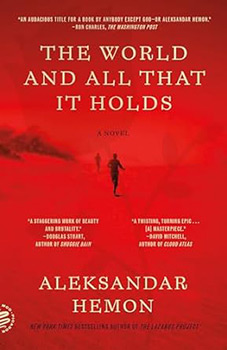Summary | Excerpt | Reviews | Beyond the book | Read-Alikes | Genres & Themes | Author Bio

A Memoir
by Gary ShteyngartA memoir of an immigrant family coming to America, as told by a lifelong misfit who forged from his imagination an essential literary voice and, against all odds, a place in the world.
After three acclaimed novels - The Russian Debutante's Handbook, Absurdistan, and Super Sad True Love Story - Gary Shteyngart turns to memoir in a candid, witty, deeply poignant account of his life so far. Shteyngart shares his American immigrant experience, moving back and forth through time and memory with self-deprecating humor, moving insights, and literary bravado. The result is a resonant story of family and belonging that feels epic and intimate and distinctly his own.
Born Igor Shteyngart in Leningrad during the twilight of the Soviet Union, the curious, diminutive, asthmatic boy grew up with a persistent sense of yearning - for food, for acceptance, for words - desires that would follow him into adulthood. At five, Igor decided to become a writer, and his grandmother paid him a slice of cheese for every page he produced. He wrote Lenin and His Magical Goose, his first novel.
In the late 1970s, world events changed Igor's life. Jimmy Carter and Leonid Brezhnev made a deal: exchange tankers of grain for the safe passage of Soviet Jews to America - a country Igor viewed as the enemy. Along the way, Igor became Gary so that he would suffer one or two fewer beatings from other kids. Coming to the United States from the Soviet Union was equivalent to stumbling off a monochromatic cliff and landing in a pool of pure Technicolor.
Shteyngart's loving but mismatched parents dreamed that he would become a lawyer or at least a "conscientious toiler" on Wall Street, something their distracted son was simply not cut out to do. Fusing English and Russian, his mother created the term Failurchka - Little Failure - which she applied to her son. With love. Mostly.
As a result, Shteyngart operated on a theory that he would fail at everything he tried. At being a writer, at being a boyfriend, and, most important, at being a worthwhile human being.
Swinging between a Soviet home life and American aspirations, Shteyngart found himself living in two contradictory worlds, all the while wishing that he could find a real home in one. And somebody to love him. And somebody to lend him sixty-nine cents for a McDonald's hamburger.
Provocative, hilarious, and inventive, Little Failure reveals a deeper vein of emotion in Gary Shteyngart's prose. It is a memoir of an immigrant family coming to America, as told by a lifelong misfit who forged from his imagination an essential literary voice and, against all odds, a place in the world.
As much as his memoir succeeds in painting the travails of Shteyngart’s experience as an immigrant straddling two cultures, it is the parts that deal with his problems with his parents that are deeply moving and his to own. It really is true that “the secret source of humor is not joy, it’s sorrow.” In Little Failure this applies both to Shteyngart’s description of the Soviet Jewish experience and to his more immediate family struggles. Even the book’s title, a nickname coined by his mother, masks layers of hurt and damage caused by parenting with total disregard for the loosely flung word...continued
Full Review
 (854 words)
(854 words)
(Reviewed by Poornima Apte).
St. Petersburg is known for its gorgeous architecture and rich history. A few of these sights, outlined below, are described in Little Failure.
The Smolny Convent
 In his memoir, Gary Shteyngart recalls coming upon a coffee-table book at a bookstore in New York City, St. Petersburg: Architecture of the Tsars, with the "baroque blue hues of the Smolny Convent Cathedral practically jumping off the cover." This seemingly chance incident triggers a near nervous breakdown in the author, bringing many childhood memories back to the surface.
In his memoir, Gary Shteyngart recalls coming upon a coffee-table book at a bookstore in New York City, St. Petersburg: Architecture of the Tsars, with the "baroque blue hues of the Smolny Convent Cathedral practically jumping off the cover." This seemingly chance incident triggers a near nervous breakdown in the author, bringing many childhood memories back to the surface.
The Smolny Convent is most distinguished by its pale blue color and its pride of place on the banks of the river Neva. The complex consists of a central cathedral and satellite churches laid out in a ...

If you liked Little Failure, try these:

The World and All That It Holds
by Aleksandar Hemon
Published 2024
The World and All That It Holds―in all its hilarious, heartbreaking, erotic, philosophical glory―showcases Aleksandar Hemon's celebrated talent at its pinnacle. It is a grand, tender, sweeping story that spans decades and continents. It cements Hemon as one of the boldest voices in fiction.

by Boris Fishman
Published 2020
The acclaimed author of A Replacement Life shifts between heartbreak and humor in this gorgeously told, recipe-filled memoir. A family story, an immigrant story, a love story, and an epic meal, Savage Feast explores the challenges of navigating two cultures from an unusual angle.
Most of us who turn to any subject we love remember some morning or evening hour when...
Click Here to find out who said this, as well as discovering other famous literary quotes!